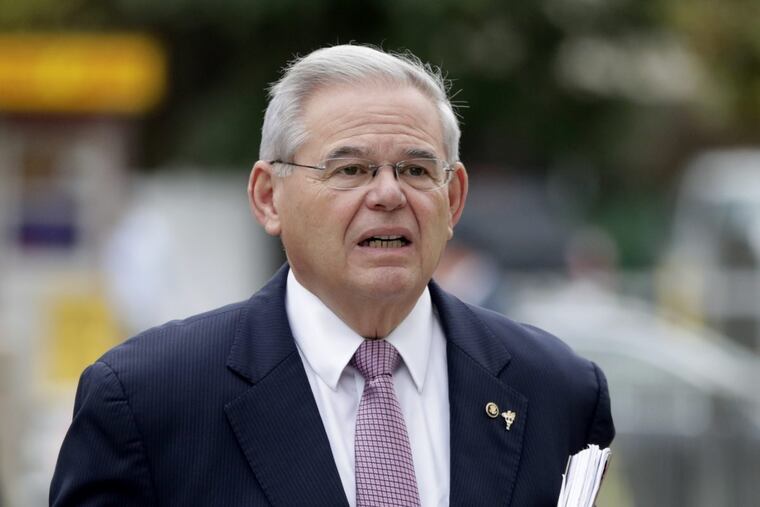The Menendez jurors said they were deadlocked. Here's what happens next
"Take as much time as you need to discuss things. There is no hurry," the judge told jurors Tuesday. "This is not reality TV. This is real life."

NEWARK, N.J. — Jurors in U.S. Sen. Bob Menendez's federal bribery trial told the judge Monday that they were unable to reach a unanimous verdict on any of the 18 counts against him and his co-defendant. Menendez, a New Jersey Democrat, is accused of accepting gifts from Florida eye doctor Salomon Melgen in exchange for taking official action to further Melgen's business and personal interests.
Q: What happens now?
U.S. District Judge William H. Walls instructed jurors to leave for the day and clear their heads. They returned Tuesday morning.
"I realize you're having some difficulty reaching unanimous agreement," Walls told them as they resumed talks. "But that is really not unusual, particularly with regard to a case such as this in its length."
He told jurors that other panels have reported being deadlocked at first and later reached agreement. "In the course of your deliberations, do not hesitate to reexamine your own views," the judge said, adding that he did not intend "to rush or pressure you into agreeing to a verdict."
(Abbe Lowell, an attorney for Menendez, objected to parts of the judge's instruction, saying he didn't follow standard procedure.)
In any case, it's not uncommon for juries to initially say they are deadlocked, only to render a unanimous verdict upon further discussion.
If jurors again report that they can't break an impasse, prosecutors could ask the judge to read what's known as an Allen charge. This is aimed at pushing intransigent jurors to reconsider the evidence supporting their positions and at least be open to other viewpoints.
Q: How long can they continue to deliberate?
The law doesn't set a time limit, and the judge seems determined to let the jury deliberate for more than just a couple days before he would consider declaring a mistrial.
After all, he noted Monday, jurors heard nine weeks of testimony and argument.
"Take as much time as you need to discuss things. There is no hurry," Walls told them. "This is not reality TV. This is real life."
The original jury deliberated for three full days last week, but after an alternate replaced a juror who left for vacation, the judge on Monday instructed the newly constituted panel to "start from scratch." The seven women and five men are clustered in a room off the fourth-floor courtroom in Newark, leaving only to take lunch breaks and head home for the night.
Q: What happens if the jury reports that it still can't reach a verdict?
It's unlikely that Walls would read the so-called Allen charge again, because that would open the door to an appeal by the defense. (That's why it's also known as the dynamite charge — you only get one shot at it.) He could urge jurors to try to find common ground on at least one count. Or, if he deems them hopelessly deadlocked, he could declare a mistrial.
Q: Would that mean the case is over?
No. Prosecutors could retry the case.
Q: What factors would play into the decision to pursue a retrial?
Prosecutors would want to know how close they got to winning a conviction. They can't contact or poll jurors directly, but if, for instance, jurors tell reporters that the vote was 11-1 in favor to convict on all counts, prosecutors would be more likely to retry the case.
"Prosecutors learn from deadlocked jurors," said Jeff Cramer, a former federal prosecutor in Chicago. For example, if a juror says a certain charge or argument was too complicated, prosecutors could drop it in a retrial and focus on more compelling evidence.
Cramer predicted prosecutors would seek a retrial, given Menendez's profile as a U.S. senator.
The decision would ultimately fall to Attorney General Jeff Sessions, a Republican, though he's likely to accept the recommendation made by experienced prosecutors, Cramer said.
(It's worth noting that Menendez was indicted in 2015 under a Democratic attorney general.)
Q: What happens to the Senate seat?
New Jersey Democrats had hoped the trial would resolve Menendez's future — but a result that leaves him neither acquitted nor convicted creates a slew of new questions heading into 2018, when the senator faces re-election.
For now at the very least, he will continue to serve out his six-year term. His allies insist that short of a conviction on the most serious charges, Menendez will run again.
Some Democrats say that anything short of a conviction is as good as an acquittal and that he will certainly run again. But others worry that Menendez could be wounded and left vulnerable to a Republican challenge. Given the near deadlock in the Senate, the race would become one of the country's most watched.
Staff writers Jonathan Tamari and Jeremy Roebuck contributed to this article.